|
|
|
Sort Order |
|
|
|
Items / Page
|
|
|
|
|
|
|
| Srl | Item |
| 1 |
ID:
167333
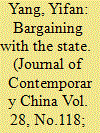

|
|
|
|
|
| Summary/Abstract |
This article investigates the interaction between the empowerment of Chinese sexual minorities through social media and its impact on the bargaining capacity of society with the State in terms of Lesbian, Gay, Bisexual and Trans-gender (LGBT) (Since ‘sexual minority’ and ‘LGBT’ are neutral terms used in news reports, social media posts and academic articles and have been translated into ‘xing shao shu’ in most cases in Chinese discourse, this article will use these two terms interchangeably for research and quotation purposes.) movements in China. Although censorship in China silences collective expression, social media empower Chinese sexual minorities to promote information publicity and increase public visibility. Moreover, by looking at the case of Qiu Bai, a lesbian college student who sued the Ministry of Education for its maladministration on homophobic textbooks in a social media environment, it indicates how LGBT activists use social media to enlighten the public during the process of fighting for their equal rights within the legal framework and more broadly, how the Internet influences the state-society relations in a traditionally sensitive issue area.
|
|
|
|
|
|
|
|
|
|
|
|
|
|
|
|
| 2 |
ID:
167329
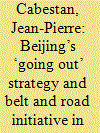

|
|
|
|
|
| Summary/Abstract |
In looking at the case of Niger, this article demonstrates that there have been a lot of similarities between China’s Belt and Road Initiative (BRI) launched in 2013 and its ‘going out’ strategy initiated in the late 1990s. Prior to 2013, many of the BRI’s objectives and strategies were already at work in Africa, and particularly in socioeconomically poor, landlocked countries that badly need infrastructure and connectivity. It also shows that China has been ready to invest in projects that are not necessarily profitable in the short term to consolidate its economic and diplomatic presence in the targeted country as well as to help its large state firms growing and internationalizing. It then demonstrates that although Niger did not belong in the initial group of countries targeted by the BRI, this initiative has contributed to deepening China’s economic and political influence in Niger, particularly to the detriment of France. Finally, this article highlights that both in Africa, particularly in the Sahel region, and in the BRI countries, China is facing emerging security challenges, continuing to mainly rely on others to overcome them.
|
|
|
|
|
|
|
|
|
|
|
|
|
|
|
|
| 3 |
ID:
167332
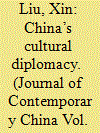

|
|
|
|
|
| Summary/Abstract |
This article explores the prominent features of China’s state-led campaign of cultural diplomacy. Through multiple comparative case studies of its flagship project of the Confucius Institute (CI), it aims to identify and contextualise the various variables affecting its effective operation. It finds that this dependent variable is mainly determined by the independent variable of the CI’s ability to localise its product and process to suit different target audiences, along with a number of extraneous variables, including ideology, nationalism and the media environment in the destinations. People-to-people interaction is also an important mediator that contributes to facilitating mutual understanding. All the variables and the complexity of their inter-relations constitute the Chinese characteristics and are charted out in a diagram.
|
|
|
|
|
|
|
|
|
|
|
|
|
|
|
|
| 4 |
ID:
167327
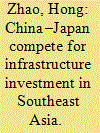

|
|
|
|
|
| Summary/Abstract |
As the two most significant Asian powers, competition in infrastructure sectors in Asia between China and Japan is inevitable. Japan is a long-established developer of regional infrastructure in Southeast Asia, while China’s interest in financing and building infrastructures there is relatively recent. After China proposed the Belt and Road Initiative (BRI) and the Asian Infrastructure Investment Bank (AIIB), Japan stepped up its efforts, determined to expand its already well-established influence. This competition has had positive as well as negative consequences for Southeast Asia and regional financial architecture. This article attempts to use Sino–Japanese competition for infrastructure financing and high-speed railway contracts as a case in point to explore in what ways and trajectory these two countries’ competition for infrastructure investment is going on, and what impacts it will create on the region.
|
|
|
|
|
|
|
|
|
|
|
|
|
|
|
|
| 5 |
ID:
167330
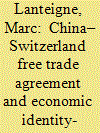

|
|
|
|
|
| Summary/Abstract |
The free trade agreement signed between China and Switzerland in 2013 was a watershed event in the economic policies of both states, a successful identity-building exercise for both actors in addition to an economic endeavour. In the case of Beijing, the Switzerland free trade agreement (FTA) was a crucial step not only in promoting its trade interests in Europe, including the European Union, but also in planning future FTAs and promoting China as a supporter of globalization and economic liberalisation. For Switzerland, the FTA further cemented that country’s identity as a distinct European economic and political actor, including in its engagement of the Chinese market.
|
|
|
|
|
|
|
|
|
|
|
|
|
|
|
|
| 6 |
ID:
167325
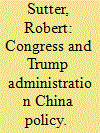

|
|
|
|
|
| Summary/Abstract |
Republican-led congressional interaction with the Donald Trump campaign and administration on China-related matters during the 2016 US election campaign and the first year of the new administration involved often grudging adjustments on both sides. Major controversy was avoided partly because China issues often were overshadowed by other policy priorities and partly because congressional Republicans feared retribution from their mercurial leader who was very popular with the party rank-and-file and often harshly punished opponents. Moreover, Donald Trump’s adjustments in 2017 saw him come into line with conventional Republican congressional views on the importance of Asian allies and partners, nuclear weapons nonproliferation and greater US pressure on North Korea and on China to influence North Korea.
|
|
|
|
|
|
|
|
|
|
|
|
|
|
|
|
| 7 |
ID:
167324
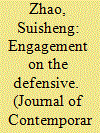

|
|
|
|
|
| Summary/Abstract |
Facing powerful challenges from both China and the US, the long-standing engagement policy is on the defensive. Focusing on advancing American economic and security interests rather than its ideals and prioritizing reciprocity above economic cooperation, the Trump administration has declared China a strategic competitor and escalated a trade war into a multi-front conflict. However, profound interdependence continues underpinning the bilateral relationship. Neither the US nor China can afford to disengage from the other. The two countries are not natural partners but not inevitable enemies either. Competition does not mean confrontation, much less war. Engagement remains the foundation for healthy competition.
|
|
|
|
|
|
|
|
|
|
|
|
|
|
|
|
| 8 |
ID:
167328


|
|
|
|
|
| Summary/Abstract |
The policies of Going Out and Good Neighbor have worked in tandem to direct Chinese diplomacy toward Southeast Asia over the past decades. This article asks how these policies have shaped Chinese energy and mining firms’ business decisions in the region. Using a combination of quantitative and qualitative data, this article argues that while Going Out and Good Neighbor have contributed to the growth of China’s energy and mining development projects in Southeast Asia, this outcome is not merely the result of a state-directed initiative. The growth is also driven by Chinese state-owned firms that take advantage of Beijing’s policy agenda and the institutional shortcomings behind it to plow state-backed resources into business partnerships with weak rule-of-law governments in the region. These partnerships and the associated projects are often touted as an arm of Chinese diplomacy, emboldening these firms to make risky expansion. Moreover, market, diplomatic, social, and geographic factors inherent to Southeast Asia further catalyze Chinese firms’ risky business practices while at the same time Beijing, prioritizing diplomatic relations over good governance, has been slow to police problems stemming from its firms’ dubious partnerships. In the end, this situation has hurt China’s image, contrary to Good Neighbor’s intended objectives.
|
|
|
|
|
|
|
|
|
|
|
|
|
|
|
|
| 9 |
ID:
167326


|
|
|
|
|
| Summary/Abstract |
This article examines the domestic influences on US and Chinese nuclear forces. While strategic factors largely drive each side’s, underappreciated domestic and organizational factors also influence outcomes. Partisan politics shape US policies regarding arms control, missile defense, and the roles of nuclear forces. China has its own— more opaque—politics. Organizational factors have affected the status and role of the Chinese Rocket Forces. Constituencies for nuclear weapons have gained ground, and the military services appear to be competing for nuclear missions. The absence of organizational firewalls within the Rocket Forces suggests that assertive operational practices might bleed across different parts of the organization. These domestic influences on US and Chinese nuclear policymaking are likely to have interactive and accelerating effects. Both sides will assume measures taken by the other are driven by strategic intent, when the actual drivers may be mixed. To the extent that domestic factors are responsible, the resulting spirals of suspicion and conflict will be inadvertent—but may nevertheless take on a life of their own. While strategic nuclear interactions are not currently at the center of the bilateral relationship, they may come to be so in the future for all the wrong reasons.
|
|
|
|
|
|
|
|
|
|
|
|
|
|
|
|
| 10 |
ID:
167331


|
|
|
|
|
| Summary/Abstract |
Many studies emphasize the authoritarian bargain to explain why authoritarian regimes develop social welfare in the absence of democratic accountability. Increased welfare support enhances economic security and, in turn, strengthens public support for the regime. However, few studies have empirically demonstrated the core part of the underlying mechanism that welfare support leads to reduced economic insecurity in non-democratic regimes. By analyzing survey data from China, this study examines how labor market programs affect public economic insecurity. The results reveal that vocational training has a U-shaped impact on risk perception. It alleviates perceived insecurity when the unemployment rate is at the low or high end and has negligible effects at the medium level of unemployment rates. Furthermore, the impact of vocational training is particularly strong for individuals with higher incomes, urban hukou, and public sector employment. In contrast, regardless of the unemployment rate, unemployment insurance has a negative effect on risk perception overall. The results show that the type of social policy and macro- as well as micro-level socio-economic attributes should be taken into account to understand the impact of social welfare.
|
|
|
|
|
|
|
|
|
|
|
|
|
|
|
|
|
|
|
|
|